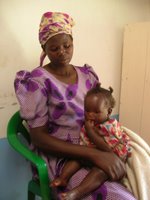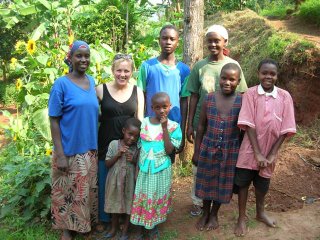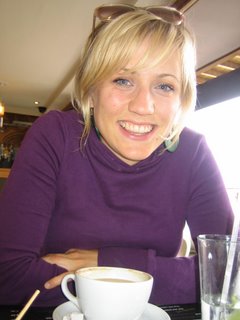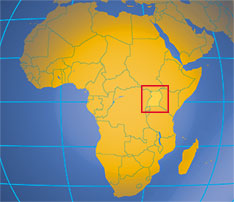RAS

(Evas and I pretending to asses a patient for the camera, in our little Aid Station. It's actually Phiona's doll!!)

(Evas and her daughter Phiona)
Many of my days are now spent at the Rubingo Aid Station (or RAS, as I affectionately abbreviate it) our tiny little two room clinic. In fact it is mostly just one room as the second room had somehow turned into a “store” room. In other words it was piled high with junk and messy cupboards full of various medical supplies! Last week Evas, Melanie and I tackled it, pulling out all the junk and storing it in another building. This also involved the revealing of a mouse who had taken up residence (part of my inspiration to clean) who promptly ran towards the door causing screams and a swift kick in the head from Evas! We made Apollo, the guard, dispose of him in the garbage. A good floor washing and a full day of organizing supplies later it was spic and span, leaving us with quite the feeling of accomplishment!
The RAS is a far cry from working at BC Childrens Hospital that’s for sure. It is basically a small dispensary where we can deal with very minor ailments and illnesses. However much more than that comes to the door sometimes! At times it is frustrating to be so limited in supplies and services, especially when I know the treatment a patient needs but we just can’t provide it! We do a lot of malaria treatment based on symptoms as we have no laboratory facilities. Also minor bacterial/yeast infections, bladder infections and well a lot, a LOT of malaria!! I call it a dispensary because what we offer is mainly oral medication, and that seems to be what people come for. Most people seem happy with some sort of pill, even if the underlying problem goes much deeper. A lot of people also seem to show up either thinking we can do a lot more than we can, or more likely….just because there are white people around they figure they will get help. I spend a lot of time trying to take detailed histories through Evas’ interpreting, and then referring people to other centers, but the problem is this… it isn’t quite so easy as that to navigate the health system here. In fact it has driven me crazy on a few occasions!! For example a mother showed up in Rubingo a month or so ago with a 9 month old baby with severe hydrocephalus (water on the brain). Poor kid couldn’t hold his head up and looked like he was constantly peering over the rim of invisible glasses! Upon further examination it was obvious he had a myelomeningocele, which I have never seen but learned about in trusty nursing school. Part of his spinal column wasn’t formed properly and there was a large bulging mass at the base of his spine where spinal fluid (and likely part of the spinal cord) was just protruding out under the skin. It is a congenital defect, meaning he was born with it. We questioned the mother and turns out it was noticed at birth and she was referred to the “real hospital” better known as the University Teaching Hospital in Mbarara. It is a government centre so treatment is free, when asked why she never took the baby for treatment the answer was that they didn’t have the money for transport to Mbarara (the nearest city, 1 ½ hrs drive). By now the baby had developed the swelling likely due to a blockage in the cerebrospinal fluid circulation and had a head the size of a watermelon. So they were back for help. Obviously there is not a lot we could do but assist them with some money for transport to town. I was reading in a textbook that said surgical treatment of this condition is usually done within the first 24 hours of life! HA!


(One of our little patients! Pretty adorable)
The frustrations are many when people turn up that are beyond our ability to help at the RAS. It is difficult to help them unless you want to pay for everyone’s complete medical care…which we don’t have the funding for. For example let me tell you a story. There is a government run clinic about 30 minutes drive from us, it has well trained medical staff and free medications…..if they are there. Course if you are a patient at Rubingo and you have to walk it’s gonna take about 3 hours to get there, and they’ll give you a prescription, but if they don’t have the medication in stock then your on your own to buy it. In Canada it’s the same except most people have some money at their disposal or a social assistance program. Here it is just another closed door. Even if we DO assist people and drive them to the government clinic sometimes that just isn’t enough. The other day a woman in her 20’s came to us, brought by her elderly mother who was one of our Mutual Benefit Society widows. This young woman could barely stand, she lay on a grass mat outside the RAS. She was skin and bones, I could actually lift her and carry her in my arms like a child. There was also a small baby with the two women, the child of the ill woman. The grandmother explained that the woman had been sick for two months and her symptoms were fever and cough. She looked like she’d been losing weight for a long time, probably had full blown AIDS but she had never been tested. Even more disturbing was the child, once revealed, a tiny bundle of skinny arms and legs with an edematous belly and an awful wet cough. It was the most malnourished child I have seen yet. It had no energy, no shine to its eyes, and looked an awful colour with a pathetic cry. Both Katie (the other nurse) and I looked at the mom and the baby and thought…well they need to go to the hospital!! The child didn’t look like it had long for this world if something wasn’t done, the mother wasn’t much better off. Course we had other programs planned for the day and so decided to pack these in the truck and take them to the government centre where hopefully they could get more assistance, there is a lab there for HIV testing and they have IV capabilities. They also have an “ambulance” to transport patients (ie pickup truck).
Off we went to find some help and, on arriving there, carried the lady into the clinic. Many people were already waiting and we asked which staff member was working today because we had a patient to be seen. Apparently everyone was still waiting for him to arrive! Luckily it wasn’t long and he soon showed up, we explained the situation to him and asked if they could please provide treatment and also an HIV test for this lady. He examined the lady and glanced at the child and told us yes they have a lab to do testing, but unfortunately the lab tech wasn’t in today. When was he coming back?! Well he’s on leave so…..who knows, no lab till then. He started to fill out a referral form for them to go to the Mbarara University Hospital and we asked how they were to get there, could the ambulance take them?! Well no the ambulance was gone, driving the clinic manager somewhere and wouldn’t be back till evening. They had to find their own way…which was almost impossible without any money and two critically ill patients being helped by this grandmother! By now we were just fed up and not trusting that they would get anymore help here we promised to return and drive them to Mbarara Hospital ourselves as KT and Laura had other business there already. Of course when you go to the hospital here you have to bring your own linens, toiletries, food and someone to care for you! So you literally can’t even afford to go to the hospital if you don’t have any money! So not only did we have to drive them ourselves to the hospital door if we wanted them to get treatment but we had to give them money just to stay there!! It’s amazing, if you want to help someone out you end up having to do everything yourself because there really is little infrastructure in the area in terms of health care. In their defense local government staff do the best they can but resources from the government are limited. It is difficult making decisions daily about who to help and who to leave. ACTS can’t afford to pay for the health care needs of everyone person who shows up at camp, we just don’t have the budget. But at the same time it is hard to just help them a bit and then hope they make it the rest of the way, but not really knowing. I guess it is hard to let go of that control over someone’s health care once you start looking after it, especially if you don’t really trust the system in the first place.
Somehow though, people manage to survive, and it is surprising how they find resources here and there when all we hear is “there is no money”. Many people come to the camp looking for assistance with one thing or another. It is quite a challenge learning to determine who has the most pressing needs and who will probably fend for themselves if we don’t step in. It’s the constant struggle of hand-outs versus fostering independence, and trust me nursing gave me little preparation for the issues of international development! We have impassioned arguments among the interns about how we can be most useful here as foreigners and often there is no clear answer. Half the time I am more of a mediator of resources than a health care provider! Everyone has a legitimate need but we can’t meet them all! North America is a perfect example of how everyone has a need they would like met if you offered, no matter how much they have!! Here it is just more culturally acceptable to show up and ask for what you want if you think someone has it! Human beings never seem to be satisfied; but no matter what the story is at the end of the day I am always better off, for reasons of money, education, experience, or opportunity, than most of the people around me. Hopefully the lesson that is to be learnt in this reality won’t be lost on me.

Gorrette, one of the widows in our Mutual Benefit Society gardens and the first HIV client of ACTS. She was resposible for making ACTS aware of The AIDS Support Organization (TASO) which lead to our HIV/AIDS client program and a partner with TASO. She was very sick at one time, near death, until she got put on Anti-Retroviral Therapy and she is now looking strong and healthy.

Doing hoome visits with Perez, Evas, Melanie and Katie. Both the women in the middle of the picture below are our HIV clients.


Visiting with one of our HIV clients at her home. The woman to the left of me is an HIV positive widow who has seven children of her own and cares for another orphan who is also HIV positive (and one of our clients)...the young girl second from the right, Rachel. This woman had a wonderful garden with beautiful sunflowers which I don't see often here! Oh and one of her kids names was George Bush!! HA HA

Melanie and I dressing up African Style with our new dresses from Alice the Seamstress!!




0 Comments:
Post a Comment
<< Home